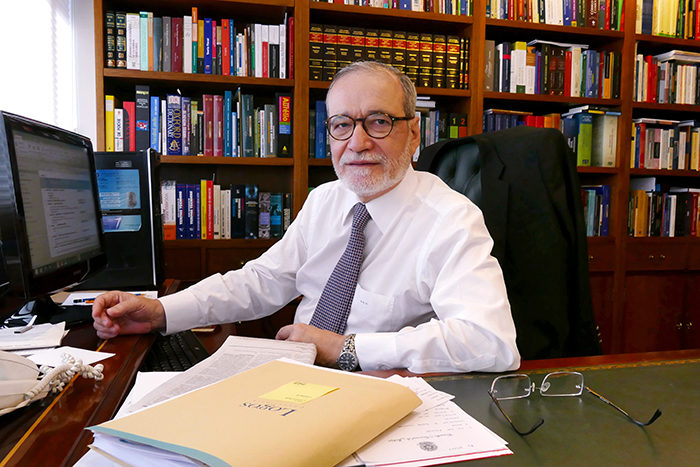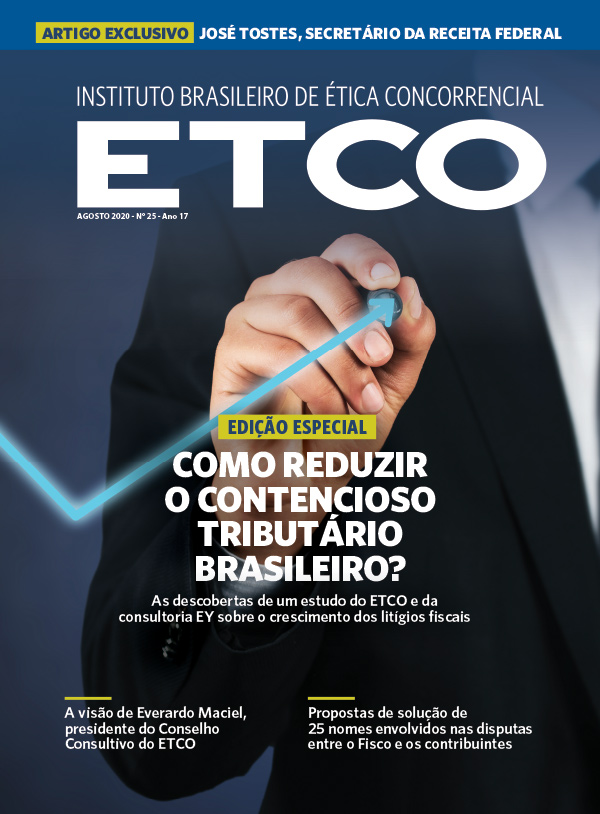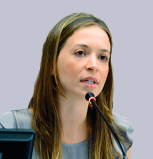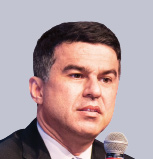"If nothing is done, it will get worse"
Tax attorney Everardo Maciel, president of the ETCO Advisory Council, discusses the causes and presents solutions for the pathology of the Brazilian tax process

In the assessment of tax attorney Everardo Maciel, president of the ETCO Advisory Council, the problem of tax litigation tends to worsen if the country's leaders are not aware of its seriousness. In his opinion, the issue is arid and politicians prefer themes that give more visibility, such as the change in the tax model. “The dimension, the magnitude, the persistence, the dysfunctionality, in short, the pathology of the tax process in Brazil, are striking,” he says.
The solutions, however, do not seem so difficult to achieve, as long as they start from the correct diagnosis. With the experience of those who commanded the Federal Revenue during the two terms of President Fernando Henrique Cardoso, between 1995 and 2002, he points out three major sources of litigation that need to be faced: the excessive freedom of the Tax Authorities to interpret tax rules and to assess taxpayers ; the endless legal demands, brought by taxpayers, on the constitutionality of tax rules, within the scope of what he calls “thesis industry”; and the lack of clarity of some legal concepts that provoke major legal disputes.
In this interview, he explains the three problems and presents the solutions he advocates for each of them. Its adoption, according to Everardo, would have the effect of turning off the tap that floods the administrative and judicial trial bodies of new cases all the time. But it would also be necessary to solve the problem of the high stock of litigation already formed - and for this issue he also presents a proposal: to allow the use of precatories, credits and accumulated losses to settle tax debts entered in active debt.
Below are the main excerpts from the interview.
ETCO Magazine: Federal tax litigation grew in five years from the equivalent of 42,7% to 50,4% of GDP, according to a survey conducted by the consultancy EY for ETCO. What to expect for the future?
Everardo Maciel: If nothing is done, it will inevitably get worse. This is what has been happening systematically over time. I think that there is still no clear awareness of the nature and extent of the problem. This issue has no political visibility. It is more charming, more elegant to talk about the creation of a new tax, claiming that it is adopted in developed countries, than to talk about procedural reforms, as it is a very arid and technical topic and, therefore, difficult to assimilate. They do not, therefore, have the necessary political appeal for them to prosper.
Our main tax problem is the process. Whatever the tax system, in the material aspect, if the process is dysfunctional, it will not work. It is clear that the incidence of taxes, therefore, tax jurisdiction, is an important matter. But the most relevant is the process. Especially in the Brazilian case, where the dimension, magnitude, persistence, dysfunctionality, in short, the pathology of the tax process is striking.
What are the reasons for the high level of tax litigation in Brazil?
Everardo Maciel: Litigation has two aspects to highlight. First, the origin of the dispute: why does it arise? Second, the resolution: how to settle the dispute generated? Let's start with the question of origin. Tax litigation basically has three sources: the tax authorities, the taxpayer or the concept. The Tax Authorities are a source of litigation, especially since there are no limits to official releases. If there are no restrictions on the drawing up of notices of infraction, they will occur. Because the Tax Authorities can make any assessment, without any cost if they are insubstantial. This is what I call “launch without charge”.
In relation to the second source of litigation, the taxpayer, the reason is related to our model for controlling the constitutionality of tax matters. More specifically, with diffuse control, which allows any taxpayer to go to court to argue the constitutionality of a rule.
Why does diffuse control fuel litigation so much?
Everardo Maciel: Because our Constitution contains an Amazon extension of tax matters. To give you an idea, the chapter on taxation has more than twice as many words as the entire United States Constitution, which does not even have a word on taxes, that is, the taxpayer has ample space to question tax matters in the constitutional aspect. . Then, a taxpayer goes to court against a certain matter and succeeds in the first instance. Your competitor files an identical lawsuit in another court, but loses. And both go a long way through the appeals court until the Federal Supreme Court closes the issue, which usually takes ten to twenty years. And in that period the loser has to continue collecting taxes and the loser, no, in a clear offense to the constitutional principle of tax isonomy. And this is accompanied by what I call the “thesis industry”, an elegant term that implies trying to discover anything that exists on the taxpayer's side in relation to which one can argue unconstitutionality and, in the end, he does not pay taxes. This in Brazil has become an industry.
And the third source of litigation, the concepts?
Everardo Maciel: These are very indeterminate or ambiguous concepts present in the tax legislation, which allow, especially on the part of the tax authorities, the generation of disputes. These are concepts that, to use an expression of my friend and ETCO companion, professor Hamilton Dias de Souza, “low normative density”. Strictly speaking, not many cases are really important. I understand that there are three quite relevant and that deserve a solution: abusive tax planning, goodwill [amount that can be deducted from Income Tax when a company acquires another for a value higher than its net worth] and the hypothesis of a substitutive fine of forfeiture in the case of fraudulent interposition in foreign trade [severe punishment applied by the tax authorities for framing the use of intermediaries in import and export operations as fraud]. These are extremely relevant matters in the constitution of disputes, but note: none of them has any relation to the nature of the tax.
So far, we have only talked about the origin of the disputes. But you said that the high litigation is also due to our system for resolving disputes
disputes. Does the current model need to be reformed?
Everardo Maciel: Dispute resolution has to do with all the administrative procedures that exist to resolve it - and our model needs extensive reform. But if I were to establish a hierarchy of importance, I would say that solving the causes that give rise to the disputes is more important than fixing the resolution procedures, because, allow me to use an everyday expression, it is useless to mop the floor with the tap open. If the process at its origin remains uncontrolled, however good the model that I may adopt for resolving conflicts, it will be ineffective due to the volume of disputes generated. Often, when trying to address this issue in Brazil, I see some attention to the resolution of the dispute, but almost no attention to the generation of the dispute.
How to solve these problems?
Everardo Maciel: Regarding the litigations originating from the tax administration, I believe in a solution that seeks to adjust to the present day ideas that were presented in the 1960s and 1970s by great tax experts, such as Rubens Gomes de Souza, Gilberto de Ulhôa Canto, Geraldo Ataliba and Gustavo Miguez de Mello. It consists of the integration of the administrative and the judicial tax process, which allows the losing party in the administrative litigation to appeal directly to the second instance of the Judiciary: the Federal Regional Court, in the case of federal taxes, or the Court of Justice, in the case of state and federal taxes. municipal.
Does it mean eliminating the first instance of the Judiciary?
Everardo Maciel: Not necessarily. If the taxpayer does not want to enter through the administrative route, he can enter through the judicial route, as it is today. But both would end up being directed to the same place. Because the appeal, both administrative and judicial at first instance, would flow into the court.
What are the main implications of this integration?
Everardo Maciel: First, it eliminates the constraint that currently prevents the tax administration from going to court when it loses the administrative proceeding. Second, it forces the loser to pay succumbence [the winning party's expenses with the process]. And with succumbence, there is now a limit to the launch, because if the launch is unsubstantiated, there will be a cost to the State. Thus, it combines authority with responsibility and prevents launch abuse.
Third, it eliminates the current requirement for taxpayers to make deposits or provide guarantees to discuss debt in court, something that is very costly for companies.
And, fourth, the integration of the process makes it possible to replace judicial enforcement with strictly administrative collection of tax credits. This would have an extraordinary effect on the functioning of the judiciary. Today, Brazil has about 80 million lawsuits in progress in the courts. Of this total, around 31 million, that is, 38% correspond to tax enforcement actions. Have you ever wondered what it means to take all that weight off the judiciary? It would be an almost revolutionary change from the point of view of the functioning of Brazilian Justice.
Is there a proposal to this effect under discussion in the country?
Everardo Maciel: This has already been tried to advance this in the Federal Senate with the Constitutional Amendment Proposal No. 112, of 2015, which originated in Operation Zelotes and the so-called CPI do Carf. This PEC, however, did not prosper, being filed, apparently, for our tendency to not deal with materials with a little more technical density, despite its relevance. But the general lines of this idea are there.
It would be necessary to change the structure of the body that handles administrative litigation, right?
Everardo Maciel: Yes. For this integration and the possibility of reviewing the administrative decision in court, it is necessary that the administrative litigation body enjoys administrative and financial autonomy. I defend the thesis that the filling of the positions of this body is done by public tender, that is, that we have independent administrative judges, who, contrary to what exists today, represent neither the tax authorities nor the taxpayers. And with vitality.
The integration must be accompanied by a constitutional provision of general rules for administrative and tax proceedings, regulated by a complementary law, and allowing the delegation of competence, in relation to this matter, from small municipalities to the States in which they are located. Today, 88% of Brazilian municipalities have less than 50 thousand inhabitants and, strictly speaking, do not have the necessary conditions to proceed with the collection, inspection and judgment of taxes. They should be allowed to delegate that competence to the state tax administration.
And disputes related to the diffuse control of constitutionality: how to resolve?
Everardo Maciel: I believe that this can be done through a change in Law No. 9.868 / 1999, which deals with concentrated control of constitutionality - one in which the questioning is made directly to the Supreme Federal Court. This law establishes the hypotheses for filing a Declaratory Constitutionality Action. Article 14, item 3, allows this type of action when there is a relevant judicial controversy. We would only need to add the following complement: “or relevant tax repercussion”.
Thus, it would not be necessary to wait for the processes involving theses to go all the way from the first instance to the Supreme Court in order to have a definitive solution. The Public Treasury, upon understanding that a certain matter has great fiscal relevance, could promptly file a Declaratory Action of Constitutionality in the STF.
What is the solution to the litigation that originates from poorly formulated concepts, such as the three you mentioned: abusive tax planning, goodwill on company acquisitions and illicit use of intermediaries in foreign trade?
Everardo Maciel: Each involves specific aspects that cannot be dealt with here, but the solution for these cases follows a general model. It consists of preparing a proposal for a tax transaction establishing a solution for the future, correcting the points of the current legislation that are generating controversy, and another for the past. And leave the taxpayer the right to choose whether or not to join this transaction.
By the way, what did you think of the tax transaction models approved by Law No. 13.988 / 2020, sanctioned in April?
Everardo Maciel: Regarding conflict resolution by direct negotiation, in the case of an individual solution, I have doubts that this will succeed. It's because? Especially because there will always be a kind of insecurity on the part of the tax authority to implement the transaction. There is always the prospect of making a decision and then being investigated by the Court of Auditors or improper action by the Public Ministry. Because such a solution is nothing trivial. When the authority establishes a discount for the debt, there is always the possibility that someone will say: "he did it wrong, he could have been tougher". And that is impossible to assess.
The so-called “thematic transaction”, I think, does not work. The thematic transaction necessarily involves amnesties. And the Constitution is absolutely clear in establishing that the amnesty, as well as the remission, the exemption, the reduction of the calculation base, can only be done by specific law that deals exclusively with the matter. I am very pessimistic about the success of this new law, but I hope that my pessimism will be disallowed by the facts.
What more important would need to be done to tackle the problem of litigation?
Everardo Maciel: The actions I talked about so far are basically about the flow, the prevention of new litigation, but we also need to face the problem of litigation stock. Cleaning measures are required in this stock. This can be done through a large offset between taxpayers' and the State's credits and debts. A possible solution would be to allow the taxpayer to use precatories, certified losses or accumulated credits, own or from third parties, to settle credits registered in active debt. If a company does not have its own credits, it can buy from third parties, giving liquidity to credits that today are illiquid. Someone may say, "But it will create a market". Yes. But sell whoever you want, buy whoever you want. With this measure, we would clear debts on both sides, reducing the volume of credits registered in active debt and also the debts of the State.





 President of Insper and ex-secretary of Economic Policy, Marcos Lisboa says that following internationally established practices would be the simplest path for Brazil
President of Insper and ex-secretary of Economic Policy, Marcos Lisboa says that following internationally established practices would be the simplest path for Brazil Getap's executive director, Zabetta Macarini Gorissen, says that Brazil has grown accustomed to resorting to litigation instead of acting directly at the source: improving tax legislation
Getap's executive director, Zabetta Macarini Gorissen, says that Brazil has grown accustomed to resorting to litigation instead of acting directly at the source: improving tax legislation Economist Lorreine Messias, author of studies on the subject, says that structural reform is necessary - and recalls that other countries can set good examples of how to do this
Economist Lorreine Messias, author of studies on the subject, says that structural reform is necessary - and recalls that other countries can set good examples of how to do this The president of Unafisco, Mauro Silva, points out the need to expand professional improvement initiatives for the staff of tax auditors of the Federal Revenue
The president of Unafisco, Mauro Silva, points out the need to expand professional improvement initiatives for the staff of tax auditors of the Federal Revenue Attorney Juliana Araújo, PGFN coordinator at TRF-3, says what the three involved in the issue should do to reduce litigation
Attorney Juliana Araújo, PGFN coordinator at TRF-3, says what the three involved in the issue should do to reduce litigation PGFN Attorney Leonardo Alvim defends tax reform and specific measures to increase legal certainty in the tax field
PGFN Attorney Leonardo Alvim defends tax reform and specific measures to increase legal certainty in the tax field Adriana Gomes de Paula Rocha, Deputy Attorney General of Consultancy and Strategy of the Judicial Representation, talks about the reasons for the congestion of tax processes in the Judiciary
Adriana Gomes de Paula Rocha, Deputy Attorney General of Consultancy and Strategy of the Judicial Representation, talks about the reasons for the congestion of tax processes in the Judiciary
